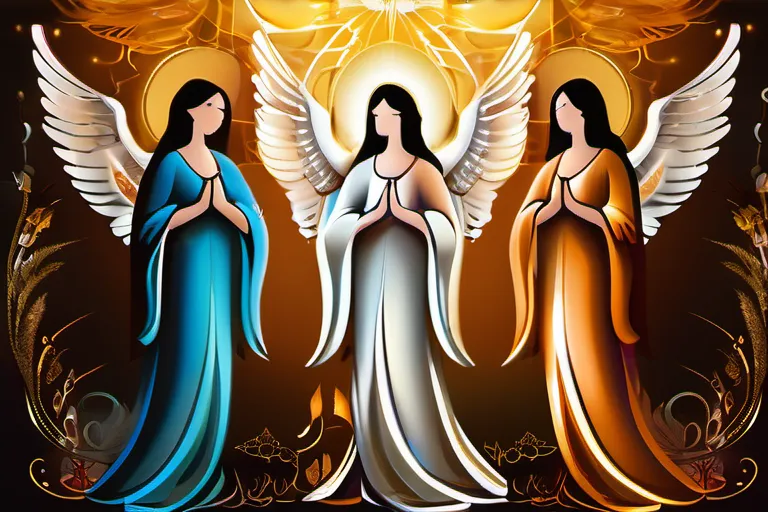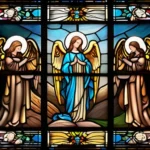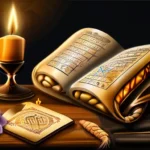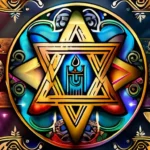Explore the significance, hierarchy, and functions of angels in Jewish beliefs.
Delve into the fascinating world of angels as we uncover their role in Judaism. From their creation to their hierarchies and functions, this guide will provide you with a comprehensive understanding of these celestial beings.
The Creation and Origin of Angels
Imagine for a moment, if you will, the grandeur and complexity of the universe as seen through the eyes of ancient Jewish theologians. How did these divine messengers come to be? The Bible offers us tantalizing glimpses into the creation and origins of angels, painting them as God’s emissaries, sent forth like rays of light from the sun.
The Book of Job speaks of a council in heaven where God gathers his hosts and his messengers. Here we see an early glimpse at the hierarchical nature of these angelic beings, hinting at their diverse roles and functions. The account in Genesis 18, where angels appear as men to Abraham, further solidifies their role as divine intermediaries.
But what exactly are these celestial beings? Are they simply messengers, or do they possess unique attributes that set them apart from mere humans? Some traditions suggest that angels were created by God to serve Him in various capacities. They are often depicted as guardians, protectors, and heralds of divine will.
Angels in Jewish beliefs are not just passive observers; they actively participate in the world’s affairs. They can be seen as a bridge between the earthly realm and the divine, their wings fluttering like those of eagles soaring high above the clouds. Each angel has its own unique role, much like how each human being is distinct in our diverse world.
Consider the example of Michael, often referred to as the Archangel, seen as a protector and defender. Then there are Gabriel, who speaks the words of God, and Raphael, known for his healing powers. These angels, like a symphony, play their parts in the cosmic orchestra orchestrated by the Almighty.
The origins and functions of these heavenly beings continue to fascinate scholars and believers alike. They remain mysterious, yet integral to the tapestry of Jewish faith, serving as the eyes and ears of God, ever vigilant in His service.
The Hierarchy of Angels in Judaism
In Judaism, the hierarchy of angels is as complex and intricate as a towering mountain range, each layer representing a different realm and function. How do we navigate this majestic landscape? Let’s start by considering the archangels, those luminous beings who stand closest to God.
Take Michael, often revered for his bravery and protection; or Gabriel, the messenger of divine truth. Are they simply names on a list, or are they living beings with distinct roles in our spiritual lives? Could these archangels be like the sun and moon, each playing a unique role in illuminating the world?
Beneath them, we find the seraphim, those fiery creatures whose wings form a veil of light. Their name, ‘seraphim,’ means ‘burning ones’ – does this imply they are not just messengers but also protectors? They stand near God’s throne, singing praises in a language too sacred for mortal ears to comprehend. Can we imagine them as the stars that guide us through life’s night?
Further down the hierarchy, we encounter cherubim, often depicted with wings and faces of animals or humans. Their presence is not just ornamental; they are guardians, watching over holy sites like the Garden of Eden. Could these beings be our silent protectors, ever watchful yet unseen?
The list continues with other angels such as dominions, principalities, and powers. Each title carries a weight of responsibility and function. Are they like different chapters in a book, each dealing with specific aspects of divine governance? Do their roles reflect the multifaceted nature of God’s command over all creation?
In exploring this hierarchy, we see angels as vital components of the cosmic order. They serve as intermediaries between the spiritual and physical worlds, much like a bridge across an immense chasm. Understanding their roles can help us grasp how the divine touches our lives in myriad ways.
Angelic Functions and Responsibilities
Imagine a world where every action, every thought, and even every breath carries a silent, unseen guardian by your side. In Judaism, this concept isn’t just metaphorical; it’s rooted in the belief that angels play a crucial role in human life. From protection to revelation, these celestial beings have a myriad of responsibilities, each intricate and significant.
One of the most profound roles of angels is guardianship. Think about it: if you were walking through an unpredictable forest with wolves howling in the distance, wouldn’t you feel safer knowing that someone was watching over you? In Jewish tradition, each person has a guardian angel, often referred to as a Malach Ha-Malchut, who ensures safety and guides one’s path. This idea brings comfort, but it also serves as a reminder of the interconnectedness between humanity and the divine.
The realm of revelation is another critical function of angels in Judaism. Have you ever wondered how prophets received their visions or how divine messages were conveyed? Angels act as messengers, delivering divine commands to human beings. For instance, when Moses was instructed to lead the Israelites out of Egypt, it was an angel who first approached him with the command. This role underscores the importance of angels in bridging the gap between heaven and earth.
Lastly, no discussion about angels would be complete without touching on their role in judgment. The concept of justice is deeply intertwined with the idea of angels in Jewish beliefs. According to tradition, when a person dies, their soul faces Gevurah, or Divine Judgment. Angels play a part in this process, ensuring that every deed is accounted for and that justice prevails. It’s like having an impartial jury overseeing the final chapter of one’s life story, where every detail is carefully weighed.
Understanding these roles helps us see angels not just as abstract beings but as active participants in our spiritual lives. They are not just celestial observers; they are integral to the fabric of human existence, influencing everything from safety and revelation to ultimate judgment.
Prominent Angels in Jewish Tradition
Imagine stepping into a world where divine messengers traverse between heaven and earth, carrying out tasks that shape our destinies. In Judaism, these celestial beings are known as angels, each with their own unique roles and significance. Let’s delve deeper into some of the most prominent angels in Jewish tradition.
Metatron, often referred to as ‘the scribe of heaven,’ plays a crucial role. Metatron is believed to be the highest-ranking angel, responsible for recording all that happens on earth. Think of him as the ultimate secretary or historian, ensuring every event and action is meticulously documented in the heavenly books. Could it be possible that even our smallest deeds are recorded by this celestial being?
Michael, another prominent figure, acts as a guardian and protector. Known for his bravery and strength, Michael defends both individuals and communities from evil forces. Imagine him as a fierce warrior, always standing guard to shield us from harm. How many times have you felt protected by an unseen force during difficult moments? Could it be Michael watching over you?
Gabriel is the angel of revelation, often tasked with delivering divine messages to prophets and leaders. Picture him as a messenger bearing scrolls or tablets, carrying God’s word directly from the heavens down to earth. Has there ever been a moment when you felt an unusual sense of clarity or guidance? Could it be Gabriel whispering in your ear?
Raphael, known for his healing powers and compassion, helps mend both physical and spiritual wounds. Think of Raphael as a skilled physician, using divine wisdom to heal the sick and wounded. Have you ever felt unexpectedly healed after prayer or reflection? Could it be that Raphael’s hands have touched your soul?
These angels, among many others in Jewish tradition, embody the myriad ways through which God interacts with His creation. Each one serves a distinct purpose, weaving intricate threads into the fabric of our existence. As we explore further into the role of angels in Jewish prayer and practice, remember that these celestial beings are not just mythological figures but integral parts of a deep spiritual tapestry.
Angels in Jewish Prayer and Practice
Imagine stepping into a prayer shul, where the air feels heavy with the weight of centuries-old traditions and the echoes of whispered prayers. How do you believe angels play their part in this sacred space? Are they mere figments of imagination or integral participants in our spiritual journey?
In Jewish practice, angels are more than just mythical beings—they are essential figures that bridge the gap between the divine and the earthly realms. During prayer, one might wonder if these celestial beings are watching over us, guiding us through our spiritual endeavors. Do they whisper encouragement during moments of despair or intervene in times of need?
The role of angels in Jewish rituals extends beyond just prayer. In Kabbalistic practices, such as the Havdalah ceremony that marks the separation between holy and mundane days, one might invoke angelic assistance to purify their soul and seek divine guidance. Are these ancient rituals imbued with the power of celestial beings, or are they mere symbolic gestures?
Mystical texts like the Zohar, a central text in Kabbalah, delve into the intricate roles of angels in the cosmic order. They serve as messengers between God and humanity, guardians of spiritual knowledge, and protectors against evil forces. How do these multifaceted roles influence our daily lives? Are we aware that every prayer or ritual might be accompanied by the invisible presence of these celestial beings?
The invocation of angels in Jewish practices is not just a matter of tradition but also a way to connect with the divine through intermediaries. In moments of crisis, many turn to specific angels like Michael for protection, or Raphael for healing. Do you think invoking an angel can make a difference? Are these beings more than just myths waiting to be debunked?
The Depiction and Symbolism of Angels in Judaism
Imagine stepping into a museum where every artwork speaks volumes about the invisible beings that guide and protect us—angels, in the Jewish faith. How do these ethereal beings manifest themselves in the rich tapestry of Jewish art, literature, and symbolism? Have you ever wondered how they are depicted in ancient manuscripts or on sacred objects?
Jewish depictions of angels often serve as metaphors for divine messengers, reflecting the complexity of their roles. In illuminated Haggadot, angels like Michael and Gabriel grace the margins, symbolizing the hand of God guiding us through life’s events. These figures are not just passive entities; they actively participate in human affairs, much like a trusted advisor offering guidance.
Their significance extends beyond visual art into the realm of literature as well. Consider the Mishnah and Talmud, where angels play pivotal roles in stories and laws. They are depicted as both benevolent protectors and formidable adversaries, depending on the context. How do these dual natures reflect the multifaceted relationships between God and humanity?
In Jewish mysticism, or Kabbalah, angels are seen as channels through which divine energy flows into the world. The Zohar discusses the angelic hierarchy, from the sublime to the more earthly beings like Malach HaMavet, the Angel of Death. What does this hierarchical structure imply about the nature of spiritual realms and our place within them?
The symbolism surrounding angels in Judaism is profound, encapsulating a wide range of human emotions and experiences. From the awe-inspiring to the comforting, these depictions help us navigate life’s challenges. Do you find yourself drawn to any particular depiction or story involving an angel? How might it resonate with your own spiritual journey?
As we delve deeper into the world of Jewish angels, remember that their portrayal is not just artistic or literary; it’s a living tradition that continues to influence and inspire generations. How do these depictions shape our understanding of divine presence in daily life?
Conclusion
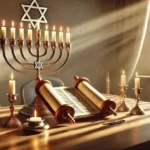 By the end of this article, you’ll have gained valuable insights into the role of angels in Judaism. Use this knowledge to deepen your understanding of Jewish beliefs and traditions.
By the end of this article, you’ll have gained valuable insights into the role of angels in Judaism. Use this knowledge to deepen your understanding of Jewish beliefs and traditions.

